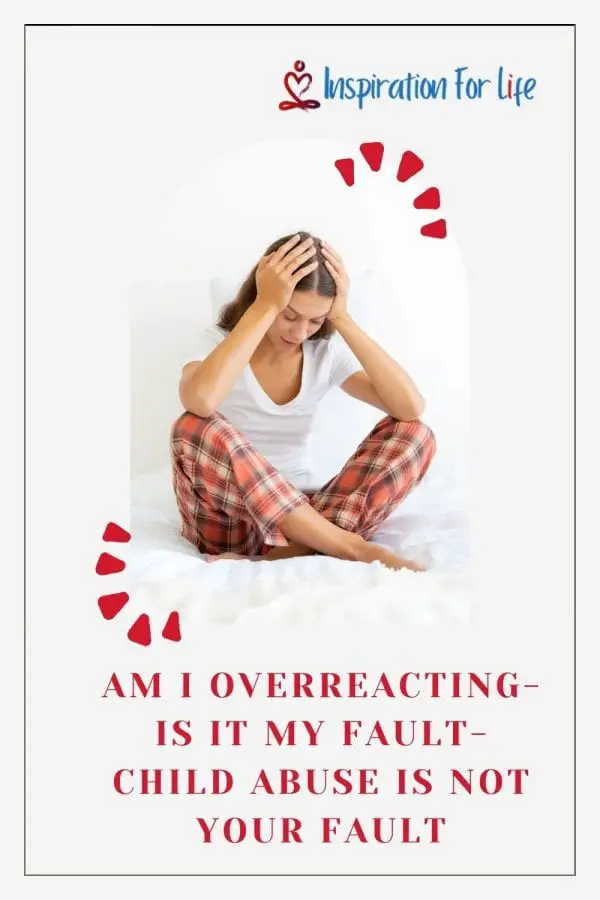Is it all my fault? Did I do enough to try and stop it? Sometimes I don’t think it is, but other times I wonder if I am overreacting. I think about the abuse that was thrust on me when I was so young and feel so guilty. Could I have stopped it? Could I have just said NO, and nothing would have happened?
These are the thoughts that go through every mind of an abused person. The guilt is real. The feeling of fault is real. Today I want to do my very best to convey that you could not have controlled the situation. You are not overreacting when you feel guilty and have trouble talking about what happened to you.
How can we help you?
Find out more information about our
exclusive private Facebook group.

Why Do You Ask “Is It My Fault?”
There are some reasons you think the abuse is your fault.
- Your abuser denies it, so you think you must be lying.
- They told you it was your fault and you caused it all.
- You ask yourself, why didn’t you try to stop it?
- You were coerced and manipulated into the abuse.
- The abuser acted as if you wanted it.
- You feel like you asked for it because you think you let it happen.
I am approaching this from a child’s perspective. You are probably an adult now, but the feelings of fault never go away. You become anxious and feel you are overreacting. Not to mention when you try to talk about it, others treat you like you are overreacting.
First, they treat you this way because they are uncomfortable with the idea of sexual abuse. The thought alone is disturbing. Regardless of how they feel, you still have the right to talk about it. You owe it to yourself to work through it, and talking about what happened is a key tool in your healing.
Back To Why, You Ask, “Is It My Fault?”
Your abuser denies it, so you think you must be lying.
Somewhere along the lines, you tried to tell someone about your abuse. When the abuser was confronted, they said you were lying. You started to believe it yourself because the person you told did not trust you to tell the truth.
The thought that you lied followed you into adulthood, and you feel guilty for your actions. OK, so stop right there. The abuse was not a part of your actions. The abuser forced themselves on you. You did not have the power to stop them.
Because another adult did not believe you, it does not make you a liar. It makes the abuser and the adult a party to horrible things that happened to you. Adults are responsible for protecting children and since that adult did not protect you, then shame on them, not on you. It was not your fault.

They told you it was your fault and you caused it all.
You were a very impressionable child. You were to love your parents and your siblings. So when your abuser told you it was your fault, you thought they must know. After all, you trusted them to take care of you. Today when you don’t trust, you feel like you are overreacting. You are not because trust is hard to gain back.
You carried the feeling of fault into adulthood with you. Now, not only do you feel like you did cause the abuse, you feel like you cause everything bad that happens to you today.
You were a child. The abuser was no doubt older than you or was an adult. The person who abused you was responsible for their actions. You can not change another person or make them do something. They made you do it!
You have to grasp the understanding that your abuser knew it was wrong, and instead of admitting it, they put the blame off on you. Again you are not, nor were you ever responsible for the actions of another person.
Because of these feelings, you may want to make everyone around you happy. You feel responsible. You are not overreacting when you do this. It is a learned process that takes time to unlearn.
You ask yourself, why didn’t you try to stop it?
This question is a need for control on your part. Something bad happened to you, and you had no control to stop it. Your control was taken away from you when another person forced themselves on you. It is not your fault.
If you were very young, then you were too small to stop it. But if you were older, like in your teenage years, the manipulation that an abuser uses debilitates you. It takes away every part of your fight and turns it into fear. When you are fearful, you are not overreacting. Fear is a coping mechanism that you will learn to overcome in time.
The abuser used your fear to keep you under their control. You can not stop an abuser. They are better at abusing others than you knew. It is not your fault.
Today I am sure you still have a fear of losing your control over a situation. When you get anxious or fearful because you don’t have the control you needed you are not overreacting. Your emotions are real and valid.

You were coerced and manipulated into the abuse.
Abusers use every means to get you to do what they want. They are manipulative by saying things that make you feel guilty or less of a person. They will use things you like to bribe you. They will even use your love for them to manipulate you.
Once an abuser has their eyes on you, you are at their mercy unless another adult stops them. It’s not your fault. You did not overreact and blow up the situation. They did wrong and used everything they could to make you feel bad.
The abuser acted as if you wanted it.
This is a big one for the abuser. The abuser needs to make you believe you want what they are doing. Their mind is warped. They do this for 2 reasons.
- To overcome the guilt, they would feel if they looked at the real truth
- To keep you from telling anyone.
My thought is if an abuser hung onto the guilt, they would not be able to continue to abuse you. They have to convince themselves that what they are doing is OK. If you tell someone, they will get in trouble. Your protectors will have to take legal action. The abuser can’t take that chance, so they do everything they can to shut you up.
The need to keep your mouth shut follows you into adulthood also. When you speak your mind, you feel guilty. You are not overreacting because keeping your mouth shut is a coping mechanism. It keeps you safe.
You feel like you asked for it because you think you let it happen.
You did not go to the abuser and ask them to abuse you, therefore, you did not ask for it. Your actions were the acts of a child or teenager. They were not manipulative or coercive. The abuser acts that way you did not. So if the abuser told you that you asked for it, they were a liar.
You did not let the abuse happen. You were the victim. Your abuser manipulated you. You may not remember or see all the ways they coerced you but believe me when I say it happened. An abuser is mentally sick, and they project that illness onto you. I didn’t say they make you mentally ill rather, they take their illness and make you feel bad. They want something they know is wrong and will use whatever means to get it.
So when you ask, “Is it my fault,” I have to say NO, NO, and NO again. It is not your fault!

How Can You Change Your Thinking-Is It My Fault?
It is tough. Abuse is something that follows you all the days of your life. But you can learn to cope with the humiliating thoughts and the thinking process that it was all your fault. The only person who is at fault in this situation is your abuser.
Child abuse actually causes changes in your brain. But the more resilient a person is, the less the abuse affects them. Let me explain, abuse alters you and changes you, but if you learn to accept that it is not your fault, the less time you will feel like you are overreacting to triggers.
Triggers are times when something reminds you of the abuse, and you revert to the helpless fear of a child.
Resilience is your ability to be tough and recover from your abuse. Your resilience comes from your ability to let go of the past. Easier said than done. I know firsthand about letting go. It is possible to do so. This doesn’t mean forgetting, but it does mean you may need some professional help.
Talking through your feelings and the abuse brings it out in the open. The deep-seated emotions are no longer just yours, but they are out of you. Talking to others gives you power over abuse. It helps to stop the feeling of overreacting and feeling like it is your fault.
Your abuse does not define you. It is not who you are. It is, however, something that hurt you and took away your control. In return, you feel at a loss to let it go. You are an overcomer!
Summary
I can tell you repeatedly that it is not your fault and that you are not overreacting to a horrendous situation. But that alone will not convince you. There are things you can do to rewire your brain.
- Read and re-read what I have written. Repeat it over and over. Convince your mind of every thought here. Then you will learn to believe that it is not your fault.
- Meet with a professional. Talk about the abuse. Let it out, so you are not alone in your struggles. Let that person give suggestions on how to overcome abuse.
- Rewire your mind with positive affirmations. When you replace the negative thought process with positive words, you are actually changing your brain’s chemicals.
It’s not your fault. You did not cause it. You did not ask for any of it. You are not bad.
Inside of you lies that little girl who is aching to get out and be free again. You are resilient. You are never overreacting. You are tough and strong. Again and again, it is not your fault.

I am a survivor of sexual abuse as a child. The walk back from the guilt and feeling of failure has been a continuous road. My goal in life is to be totally transparent about my life. I want to use what I have learned to help you overcome the abuse in your life.
The advice I give you today is the very things I have used to overcome. Still, there are times that I feel like it is my fault, and when I am triggered, I feel like I am overreacting. But with the tremendous progress I have made over the years makes each encounter more manageable. I can lead a functional life and enjoy who I am.


